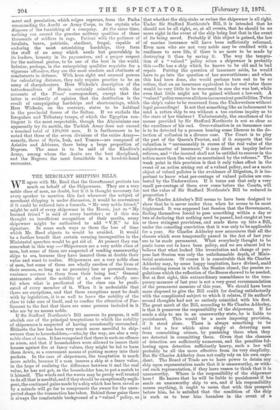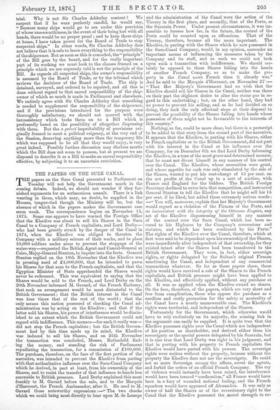THE MERCHANT SHIPPING ELLS.
'WE agree with Mr. Reed that the Government protests too much on behalf of the Shipowners. They are a very noble class of men, no doubt, but if it is thought necessary for every speaker to mention this fact whenever the subject of merchant shipping is under discussion, it would be convenient if it could be reduced into a formula. " My very noble friend," might be said of every shipowner in the House, just as " My learned friend " is said of every barrister ; or if this was thought an insufficient recognition of their merits, every shipowner might be authorised to add " V.N." to his signature. In some such ways as these the loss of time which Mr. Reed objects to would be avoided. It would be a further benefit that certain seeming incongruities in the Ministerial speeches would be got rid of. At present they run somewhat in this way Shipowners are a very noble class of men, but some of them are suspected of sending unseaworthy ships to sea, because they have insured them at double their value and want to realise. Shipowners are a very noble class of men, but some of them are wholly careless of the lives of their seamen, so long as no pecuniary loss or personal incon- venience accrues to them from their being lost.' General statements about the nobility of a class are chiefly use- ful when what is predicated of the class can be predi- cated of every member of it. When it is undeniable that there are exceptions, and that these exceptions must be dealt with by legislation, it is as well to leave the nobility of the • class to take care of itself, and to confine the attention of Par- liament to the fact that there are some persons included in it who are by no means noble.
If Sir Stafford Northcote's Bill answers its purpose, it will abolish one of the principal temptations to which the nobility of shipowners is suspected of having occasionally succumbed. Hitherto the law has been very much more merciful to ship- owners than to householders,—who,by the way, are also a very noble class of men. It has recognised that there is such an offence as arson, and that if householders were allowed to insure their houses against fire at fancy values, they might be led to burn them down, as a convenient means of putting money into their pockets. In the case of shipowners, the temptation is much more subtle, because if a man insures a ship at a fancy value, in the hope of realising the difference between it and the real value, he has not got, as the householder has, to put a match to it himself. The winds and the waves may be pretty well trusted to do all that is needful, and if they should be exceptionally negli- gent, the continued gains made by a ship which has been saved as by a miracle will go far to compensate the owner for the unex- pected shape the transaction has taken. Behind these gains there is always the comfortable background of a "valued " policy, so I that whether the ship sinks or swims the shipowner is all right. Under Sir Stafford Northcote's Bill, it is intended that he should not be all right, or, at all events, that he should be no more right in the event of the ship being lost that in the event of its being saved. Probably if this object is gained, the law of marine insurance will have been sufficiently reformed. Even men who are not very noble may be credited with a readiness to save life, if there is no more to be made by destroying it than by saving it. The way the tempta- tion of a " valued " policy seizes a shipowner is probably this :—He has a ship which he knows to be old and in bad repair. Putting the question of insurance aside, he would have to go into the question of her seaworthiness ; and when this had been done, she would perhaps turn out to be so rotten, that on an insurance equivalent to her real value there would be very little to be recovered in case she was lost, while even that little might not be gained without a law-suit. A "valued" policy removes all these inconvenient possibilities. Twice the ship's value to be recovered from the Underwriters without legal proceedings! Is not that something like an inducement to send a rotten ship to sea without a too curious inquiry as to the state of her timbers ? Unfortunately, the excellence of the means provided by Sir Stafford Northcote is not so clear as the excellence of his end. Over-valuation in an insurance case is to be detected by a process bearing some likeness to the de- tection of collusion in a divorce case. The Court is to play the part of the Queen's Proctor, and if it suspects that the valuation is " unreasonably in excess of the real value of the subject-matter of insurance," it may direct an inquiry before referees, and "the insured shall not be entitled to recover in the action more than the value as ascertained by the referees." The weak point in this provision is that it only takes effect in the event of an action arising out of a valued policy, and as a main object of valued policies is the avoidance of litigation, it is im- portant to know what per-eentage of valued policies are con- tested by the Underwriters. If it turns out that only a very small per-centage of them ever come before the Courts, will not the value of Sir Stafford Northcote's Bill be reduced in proportion Sir Charles Adderley's Bill seems to have been designed to show that he is never cooler than when he seems to be most frightened. It was supposed last Session that the Government, finding themselves forced to pass something within a day or two of declaring that nothing need be passed, had caught at two or three stringent provisions, and made them up into a Bill, under the consoling conviction that it was only to be applicable for a year. Sir Charles Adderley now announces that all the clauses which were temporarily passed in the Act of last year are to be made permanent. What everybody thought to be panic turns out to have been policy, and we are almost led to believe that what looked like irresolution and change of pur- pose last Session was only the unfathomable depth. of Minis- terial acuteness. Of course it is conceivable that Sir Charles Adderley may, by some happy inspiration, have divined, amid the exciting scenes in which the Session closed, the precise re- gulations which the reflection of the Recess showed to be needed. But at first sight, this extraordinary resemblance to the tem- porary measure of last year is not a very great recommendation of the permanent measure of this year. We should have been more disposed to give the Bill credit for dealing satisfactorily with the complicated subject to which it relates, if its author's second thoughts had not so entirely coincided with his first. The great merit of the Bill, according to Sir Charles Adderley, is that it preserves the responsibility of the shipowner. If he sends a ship to sea in an unseaworthy state, he is liable to punishment. This would be a more imposing provision, if it stood alone. There is always something to be said for a law which aims singly at deterring men from committing crimes, by punishing them when they are detected in committing them. Given that the chances of detection are sufficiently numerous, and the penalties fol- lowing upon detection sufficiently heavy, such a law will probably be all the more effective from its very simplicity. But Sir Charles Adderley does not really rely on his own expe- dient. The Board of Trade are to have power to detain any ship upon representation made that it is unseaworthy, or with- out such representation, if they have reason to think that it is unseaworthy. Where is the responsibility of the shipowner here He knows that he will be liable to punishment if he sends an unseaworthy ship to sea, and if his responsibility means anything, it ought to mean that with this prospect before him, he is satisfied that the condition of the ship is such as to bear him harmless in the event of a
trial. Why is not Sir Charles Adderley content I We suspect that if he were perfectly candid, he would say, " Because many ships would go to sea under this provision of whose unseaworthiness, in the event of their being lost with all hands, there would be no proper proof ; and to keep these ships at home, I have taken power for the Board of Trade to stop suspected ships." In other words, Sir Charles Adderley does not believe that it is safe to leave everything to the responsibility of the shipowner. But as soon as this is conceded, the " principle" of the Bill goes by the board, and for the really important part of its working we must look to the clauses framed on a principle which we are expressly told is not the principle of the Bill. As regards all suspected ships, the owner's responsibility is assumed by the Board of Trade, or by the tribunal which reviews the decisions of the Board of Trade. The ship is detained, surveyed, and ordered to be repaired, and all this is done without regard to that sacred responsibility of the ship- owner of which so much is made in Parliament and elsewhere. We entirely agree with Sir. Charles Adderley that something is needed to supplement the responsibility of the shipowner, and if the provisions introduced for the purpose were thoroughly satisfactory, we should not quarrel with the inconsistency which tacks them on to a Bill which is professedly based on the possibility of altogether dispensing with them. But the a priori improbability of provisions ori- ginally framed to meet a political exigency, at the very end of the Session, deserving anything more than the temporary life which was supposed to be all that they would enjoy, is very great indeed. Possibly further discussion may disclose merits which the Bill does not seem to possess, but at present we are disposed to describe it as a Bill to make an unreal responsibility effective, by subjecting it to an uncertain restriction.



































 Previous page
Previous page